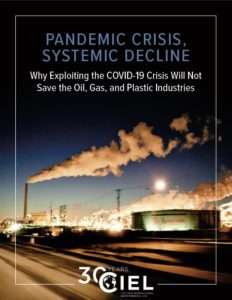
Amidst a global pandemic caused by the novel coronavirus, the oil, gas, and plastic industries are exploiting the crisis by aggressively lobbying for massive bailouts and special privileges in a desperate attempt to revive an oil and gas industry already in decline.
Pandemic Crisis, Systemic Decline: Why Exploiting the COVID-19 Crisis Will Not Save the Oil, Gas, and Plastic Industries documents how long-term systemic declines in the oil and gas industry had been accumulating long before the coronavirus pandemic emerged. Compounded by the impacts of the pandemic and related economic crisis, the industry’s collapse has accelerated, with leading companies losing an average of 45% of their value since the start of 2020.
While the current crises have exacerbated the industry’s collapse, its underlying risks remain unchanged. Ultimately, government bailouts and regulatory rollbacks will not reverse the inevitable decline of the oil, gas, and plastic industries.
Recommendations:
- Public Officials taking policy action to respond to COVID-19 and the economic collapse should not waste limited response and recovery resources on bailouts, debt relief, or similar supports for oil, gas, and petrochemical companies.
- Institutional Investors and Asset Managers should recognize the overwhelming evidence that the risks of continued investment in fossil fuels now substantially outweigh the benefits, and they should rebalance their portfolios to eliminate their exposure to volatile and declining oil and gas assets.
- Frontier Countries considering whether to open their lands, waters, and democracies to new oil and gas extraction should urgently reassess their prospects in light of the collapse in oil prices and demand, demonstrated severe risks of economic dependence on volatile oil markets, ongoing long-term decline of the sector, and its fundamental incompatibility with climate action.
- Local Communities and Decisionmakers should reject demands from the oil, gas, and petrochemical sectors for public subsidies, tax abatements, lax environmental enforcement, or other special concessions. They should interrogate industry promises of long-term sustainable employment actively and skeptically, and they should require evidence to support those claims that goes beyond simplistic assumptions of market growth. In the rare circumstances where these burdens are met, affected communities should require project proponents to irreversibly commit the funds required to restore communities and the environment when the project reaches the end of its economic life.
